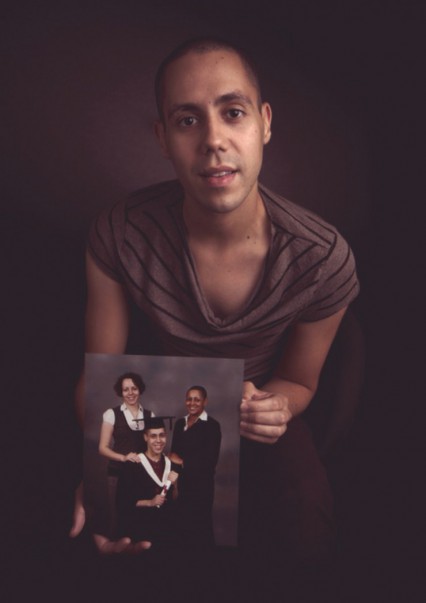As a major project in the centre of this year’s Black History Month, Tangled Roots is hitting the road with a tour of workshops and performances. Hannah Lawson, as part of our Black History Month coverage, caught up with one of the Tangled Roots writers, Adam Lowe for a quick Q&A session between events.
*
Hannah Lawson: On the tour, you’re holding life writing classes for the local community at each venue before the play, and then incorporating some of the writing from the workshop into the performance. It’s an intriguing format – how do you approach the challenges of doing a different performance every night?
Adam Lowe: Thankfully, we’re writers (except for actor Lladel Bryant), so we decided on a live literature format that would enhance the impact of the words over any performance. That means we opted for a ‘radio play’ format. So we’ve got a red ‘on-air’ sign and stand at mics with scripts. That allows us to improvise a little bit, and to use material written on the day.
The radio play format was actually my suggestion. I’m a huge fan of BBC Radio 4 dramas and radio plays – such as The Hitchhiker’s Guide to the Galaxy – and recognised the literary qualities of such shows over, say, TV shows. I’m glad producer Katy Massey agreed.
Do you find people’s experiences vary a lot across different parts of the country, or are we essentially looking at the same issues?
Everyone’s experiences are different, but there are so many things we’ve encountered again and again. What people seem to forget is that at the heart of every mixed or multi-racial family is a love story. Two people of different races either fell in love and had a child, or two parents of one race adopted a child of another race, or whatever. People and their relationships form the basis for all these stories.

Are most of the people who attend your writing workshops from mixed race families themselves, or has it been attracting a more general audience?
We’ve had people from all kinds of backgrounds. Some are the parents or grandparents of mixed race children, or are mixed race themselves. Others are just interested in learning more and in developing their life writing.
Do you find yourself more often using comedy or tragedy to explore racial issues in your writing?
There are elements of comedy and some more poignant issues in the book and the performance, but there’s a real mix. My own story explores hybridity – of race as well as gender. I use my experiences of being queer and mixed race, for instance, to riff off each other. And there are certainly some humorous elements in that – such as my dad buying me a Marilyn Monroe wig as a child.
How important do you think Black History Month is?
I think it’s essential. Every day is White History Day. This is our chance to reflect, remember and celebrate.
How effective in raising awareness do you think it is?
It’s always a struggle to raise awareness when your culture is deemed ‘other’, but some organisations and local councils really push their Black History Month programmes, which is fantastic. We see more and more being discussed in classrooms and in cultural spaces.
In your experience are white people generally too afraid of offending people of other ethnicities when discussing race, or not afraid enough?
The UK is very different to the US. I noticed that British people of all races can often get anxious when you mention race. Even when people were watching our show, there was a tangible change in atmosphere every time we said the words ‘white’ and ‘black’. But people were willing to have those sensibilities challenged and to listen to what we had to say, which shows that we do want to learn and we do want to listen. The great thing about Tangled Roots is that it doesn’t lecture – it’s just real life stories told honestly and with a lot of charm. That makes it easier, I guess.
As part of BHM I am also looking at Regent’s Park Theatre’s production of To Kill a Mockingbird. Do you think the issues it raises are still relevant today?
Literature is always relevant. And racism is still an issue. So I would say that yes, they are. Besides, we read Shakespeare from centuries ago – so why not Harper Lee?











